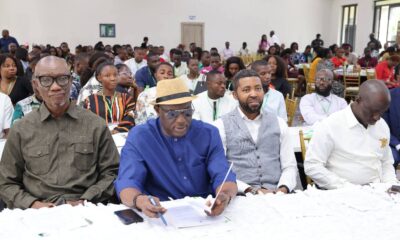Opinion
As They Reject Nigerian Prisons
T
he recent report
about some Nigerians serving various jail terms with the United Kingdom rejecting the plan to have them return to the country to complete their terms due to poor prison facilities and stigma once again brings to the fore the appalling conditions of the country’s prisons.
It would be recalled that Nigeria and UK in December 2013 signed a Prisoner Transfer Agreement (PTA) which will make it possible for prisoners to return home and complete their terms.
Prisons all over the world are set up by law to provide restraint and custody of individuals acused or convicted for crime by the state. Like many others, Nigerian Prison Service is charged with the responsibility of reforming prison inmate, and also protect the society from convicted fellows. It also has a duty to keep in safe custody persons legally sentenced to jail and identify the causes of their inherent anti-social behavior, treat and reform them to become law abiding citizens. The prison has also the responsibility to train inmates in trades that will make them useful to themselves and society at in general.
Incidentally, Nigerian Prisons cannot be said to have met all these objectives. Many have observed that prisons in Nigeria are incomparable to the ones in many other countries. Instead of reforming inmates, Nigeria prison system is said to be hardening them and subjecting them to horrible, degrading conditions and punishments sometimes exceeding the crimes committed, in the process, rendering inmates physically and psychologically damaged, unwanted, unloved and abandoned in an uncaring environment.
Some have also noted that while prisoners in countries like UK are treated with dignity, awaiting trial inmates in prisons in Nigeria are subjected to inhumane treatment and convicted prisoners denied of their fundamental rights.
Most of these prisons are characterized by over crowding, poor living conditions, inadequate facilities, poor staff morale, poor funding and many other. In 2012 Members of the Senate Committee on intrrior who embarked on a tour of prison in the country were shocked by what they saw. They decried the dilapidation of the prisons, saying that they were no longer fit for human habitation. In its annual report to the senate the committee said, “a majority of the cells leak during the rains and the perimeter cases, collapsed … many of the cells meant to accommodate about 50 inmates were found to accommodate about 150 inmates, all cramped together.”
Records also show that most of these cells are over crowded by Awaiting Trial-Inmates (ATMs) A recent report by ThisDay Newspaper puts the figure of ATMs prisons in Nigeria to 34,328.
Our constitution stipulates that “a person shall be tried within two months from the date of his detention”. This is hardly so as some people have been on detention for years without trial. The result is that the scantly available facilities and fund are over stretched.
Unfortunately, no serious attempt has been seen to be made by successive government to improve plights of detainees and other inmates in the nation’s prison.
It is therefore imperative that for the PTA between our country and other countries to work, government should upgrade the facilities in our prisons. Our prisons have to be decongested to made habitable for offenders. To achieve this, criminal justice system should speed up the prosecution of inmates so as minimize the number of inmate on awaiting trial. A situation in which criminal prosecutions take eternity to conclude should also be discouraged. The authorities adopting alternatives to imprisonment like community sentencing, supervision and others.
Most importantly prisons rights in its totality should be championed. Prisoners should have right to access to medical facilities, right to decent food, right to good living conditions, and many others. A situation where inmates take turns to sleep on the bare floor should be totally discouraged. Their human dignity should not be denied them.
There is urgent need for a massive overhaul to transform prisons in the country to correctional facilities which they are really meant to be.
Perhaps when all these are done, when those in authority are ready to spend more money on the prisons reform agenda and re-integration programme, Nigerians in foreign prisns many consider coming back home to carry out their sentences.
There is also need for Nigerians travelling to other countries to be educated on the laws of those nations and the need for them to abide by them. As the chairman of the House Committee in Diaspora, Abike Dabiri-Erewa stated after the committee’s visit to south Africa prisons recently, “the increasing number of our country men in foreign prisons is ridiculously embarrassing. There must be a way to interact with Nigerians in Diaspora and continuously advise them to stay away from crime?
Calista Ezeaku
Opinion
Why Reduce Cut-Off Mark for C.O.E ?
Opinion
Welcome! Worthy Future For R/S
Opinion
Restoring Order, Delivering Good Governance
The political atmosphere in Rivers State has been anything but calm in 2025. Yet, a rare moment of unity was witnessed on Saturday, June 28, when Governor Siminalayi Fubara and Minister of the Federal Capital Territory, Chief Nyesom Wike, appeared side by side at the funeral of Elder Temple Omezurike Onuoha, Wike’s late uncle. What could have passed for a routine condolence visit evolved into a significant political statement—a symbolic show of reconciliation in a state bruised by deep political strife.
The funeral, attended by dignitaries from across the nation, was more than a moment of shared grief. It became the public reflection of a private peace accord reached earlier at the Presidential Villa in Abuja. There, President Bola Ahmed Tinubu brought together Governor Fubara, Minister Wike, the suspended Speaker of the Rivers State House of Assembly, Martin Amaewhule, and other lawmakers to chart a new path forward.
For Rivers people, that truce is a beacon of hope. But they are not content with photo opportunities and promises. What they demand now is the immediate lifting of the state of emergency declared in March 2025, and the unconditional reinstatement of Governor Fubara, Deputy Governor Dr. Ngozi Odu, and all suspended lawmakers. They insist on the restoration of their democratic mandate.
President Tinubu’s decision to suspend the entire structure of Rivers State’s elected leadership and appoint a sole administrator was a drastic response to a deepening political crisis. While it may have prevented a complete breakdown in governance, it also robbed the people of their voice. That silence must now end.
The administrator, retired naval chief Ibok-Ette Ibas, has managed a caretaker role. But Rivers State cannot thrive under unelected stewardship. Democracy must return—not partially, not symbolically, but fully. President Tinubu has to ensure that the people’s will, expressed through the ballot, is restored in word and deed.
Governor Fubara, who will complete his six-month suspension by September, was elected to serve the people of Rivers, not to be sidelined by political intrigues. His return should not be ceremonial. It should come with the full powers and authority vested in him by the constitution and the mandate of Rivers citizens.
The people’s frustration is understandable. At the heart of the political crisis was a power tussle between loyalists of Fubara and those of Wike. Institutions, particularly the State House of Assembly, became battlegrounds. Attempts were made to impeach Fubara. The situation deteriorated into a full-blown crisis, and governance was nearly brought to its knees.
But the tide must now turn. With the Senate’s approval of a record ?1.485 trillion budget for Rivers State for 2025, a new opportunity has emerged. This budget is not just a fiscal document—it is a blueprint for transformation, allocating ?1.077 trillion for capital projects alone. Yet, without the governor’s reinstatement, its execution remains in doubt.
It is Governor Fubara, and only him, who possesses the people’s mandate to execute this ambitious budget. It is time for him to return to duty with vigor, responsibility, and a renewed sense of urgency. The people expect delivery—on roads, hospitals, schools, and job creation.
Rivers civil servants, recovering from neglect and under appreciation, should also continue to be a top priority. Fubara should continue to ensure timely payment of salaries, address pension issues, and create a more effective, motivated public workforce. This is how governance becomes real in people’s lives.
The “Rivers First” mantra with which Fubara campaigned is now being tested. That slogan should become policy. It must inform every appointment, every contract, every budget decision, and every reform. It must reflect the needs and aspirations of the ordinary Rivers person—not political patrons or vested interests.
Beyond infrastructure and administration, political healing is essential. Governor Fubara and Minister Wike must go beyond temporary peace. They should actively unite their camps and followers to form one strong political family. The future of Rivers cannot be built on division.
Political appointments, both at the Federal and State levels, must reflect a spirit of fairness, tolerance, and inclusivity. The days of political vendettas and exclusive lists must end. Every ethnic group, every gender, and every generation must feel included in the new Rivers project.
Rivers is too diverse to be governed by one faction. Lasting peace can only be built on concessions, maturity, and equity. The people are watching to see if the peace deal will lead to deeper understanding or simply paper over cracks in an already fragile political arrangement.
Wike, now a national figure as Minister of the FCT, has a responsibility to rise above the local fray and support the development of Rivers State. His influence should bring federal attention and investment to the state, not political interference or division.
Likewise, Fubara should lead with restraint, humility, and a focus on service delivery. His return should not be marked by revenge or political purges but by inclusive leadership that welcomes even former adversaries into the process of rebuilding the state.
“The people are no longer interested in power struggles. They want light in their streets, drugs in their hospitals, teachers in their classrooms, and jobs for their children. The politics of ego and entitlement have to give way to governance with purpose.
The appearance of both leaders at the funeral was a glimpse of what unity could look like. That moment should now evolve into a movement-one that prioritizes Rivers State over every personal ambition. Let it be the beginning of true reconciliation and progress.
As September draws near, the Federal government should act decisively to end the state of emergency and reinstate all suspended officials. Rivers State must return to constitutional order and normal democratic processes. This is the minimum requirement of good governance.
The crisis in Rivers has dragged on for too long. The truce is a step forward, but much more is needed. Reinstating Governor Fubara, implementing the ?1.485 trillion budget, and uniting political factions are now the urgent tasks ahead. Rivers people have suffered enough. It is time to restore leadership, rebuild trust, and finally put Rivers first.
By: Amieyeofori Ibim
Amieyeofori Ibim is former Editor of The Tide Newspapers, political analyst and public affairs commentator
-
Politics12 hours ago
Bayelsa APC Hails Late Buhari As Change Agent In Nigerian Politics
-
News9 hours ago
South-South contributes N34trn to Nigeria’s economy in 2024 – Institute
-
Niger Delta11 hours ago
Police Rescue Kidnap Victim, Recover Pistol In A’Ibom
-

 Politics10 hours ago
Politics10 hours agoINEC Trains Political Parties Officials On ICNP Use Ahead By-Elections
-

 Business12 hours ago
Business12 hours agoReplace Nipa Palms With Mangroove In Ogoni, Group Urges FG, HYPREP
-

 Business9 hours ago
Business9 hours agoNCDMB, Dangote Refinery Unveil JTC On Deepening Local Content
-
Niger Delta11 hours ago
C’River Hands Over Rubber Plantation to Private Company
-

 Nation10 hours ago
Nation10 hours agoHYPREP Reaffirms Support For Ogoni Youths …Organises Workshop For Undergraduates

